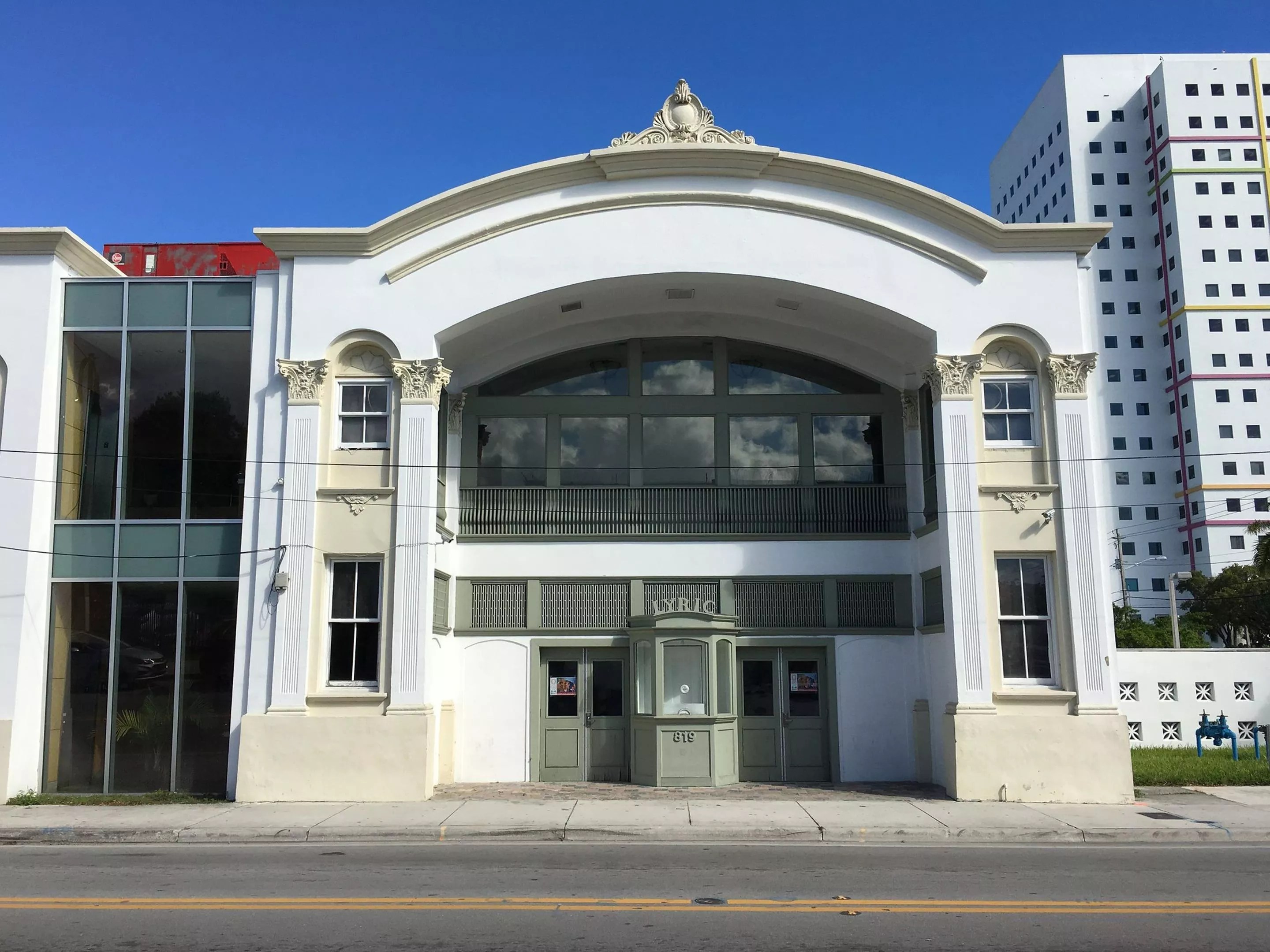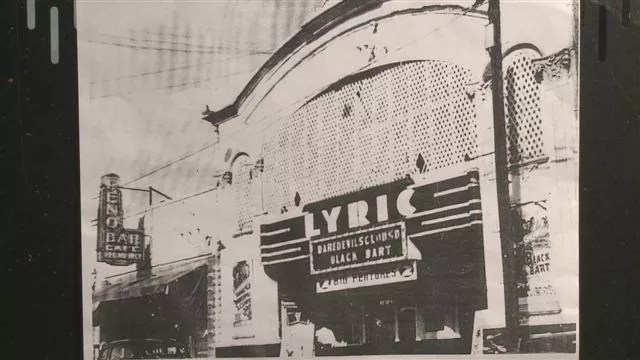
Photo by Phillip Pessar/Flickr

Audio By Carbonatix
Deemed the “Crown of Overtown” for more than a century, the Black Archives Historic Lyric Theater stands in the heart of Overtown as the only preserved relic of the neighborhood’s heydays.
The theater’s 110th-anniversary celebration is set to take place on Saturday, November 18, at the Lyric, paying homage to the venue’s legacy with performances by Keke Wyatt, Raheem DeVaughn, and the Melton Mustafa Orchestra. Guests will be immersed in the glory days of the Lyric and Overtown and are encouraged to wear attire that harkens back to the ’30s and ’50s.
The soiree is helmed by the Black Archive’s executive director, Kamila E. Pritchett, who worked at the organization for a decade before taking the baton from the previous executive director, Timothy Barber.
“This is a milestone event. As the first year with new leadership, it’s not only celebrating a storied past, but it’s also looking to a bright future,” Pritchett tells New Times. “While I am grateful for the leadership Tim exhibited when he was at the Archives, I wanted people to see that in the ten years I’ve worked at the Black Archives, I’ve cultivated my own vision to move the organization to the next step.”
Built in 1913 by Georgia native and businessman Geder Walker, the 400-seat theater began as a silent film and vaudeville playhouse. When Walker arrived in the late 1800s, Overtown was Colored Town, a designated neighborhood where strict Jim Crow laws confined Black residents. Miami’s swelling Black population mainly consisted of Bahamian and Southern laborers who were primarily responsible for building the city’s infrastructure before it was incorporated in 1896 and decades after. Yet, segregation mandates shunted them from the economic benefits.
Despite the city’s growing racial tensions, the Lyric quickly became a popular mainstay and entertainment hub for locals and renowned Black entertainers. Two years after it was built, the Miami Metropolis described the Parisian-inspired theater as “possibly the most beautiful and costly playhouse owned by Colored people in all the Southland.” After Walker passed in 1919 and his wife took over, the theater transformed into a community staple where commencement ceremonies and vibrant emancipation parades occurred. Overtown’s Black magnates Dana Albert “D.A.” Dorsey, a real-estate tycoon and one of Florida’s first black millionaires, and Richard E.S. Toomey, a poet and Miami’s first Black attorney, were also involved in those early celebrations, says Nadege Green, founder of the multimedia history and storytelling platform Black Miami-Dade.

In the 1940s, the Lyric Theater was a popular entertainment hub for prolific Black musicians and scholars from all over the country.
The Black Archives History & Research Foundation of South Florida photo
“This was an annual event in early Miami,” Green says, “When we think about the spaces for Black joy, for Black gathering, for Black resistance, all of these things were happening in early Miami at the Lyric Theater.”
In the 1920s, the street where the Lyric perched was renamed from Avenue G to NW Second Avenue, a bustling entertainment strip known as “Little Broadway.” A wave of Black-owned businesses, nightclubs, halls, theaters, and a trolley car line dotted the street alongside the Lyric and attracted the likes of Marion Anderson, Bessie Smith, Ethel Waters, Gertrude Cox, Muhammad Ali, and Nat “King” Cole. What Pritchett describes as “the epicenter of Black life” in Miami was also regarded as the “Harlem of the South.” Businesses around the Lyric were booming as Overtown saw a rise in its Black middle-class population.
When segregation laws kept Black jazz singers from staying in Miami Beach after their performances, they would check in to hotels in Overtown and perform at the Lyric and other nightclubs without being discriminated against.
“Not only were Black people spending their money in the community, those night clubs and businesses were also patronized by white people who knew the nightclub scene in Overtown was the place to be,” Pritchett says.
Up until the late ’50s, the Lyric continued to attract prolific Black artists and scholars like Aretha Franklin, W.E.B. Du Bois, Mary McLeod Bethune, Ella Fitzgerald, Billie Holiday, and Sammy Davis Jr. Soon after, the Lyric turned into a movie theater before becoming a church.
Then, the expansion of I-95 fractured the city.
By the early 1960s, government officials used eminent domain to force thousands out of their homes and seize buildings. The neighborhood soon deteriorated, and the Lyric – once a statuesque arena – withered from neglect. The businesses, clubs, hotels, and theaters that dotted the heart of Overtown were eventually demolished.

The Black Archives Historic Lyric Theater continues to be a hub for the community today.
The Black Archives History & Research Foundation of South Florida photo
The church housed inside the Lyric eventually shuttered, and the building became the only symbol left of Little Broadway. Unlike the other buildings surrounding it, the structure didn’t face the same demise from city officials. Pritchett says divine intervention and the work of Black Archives founder and archivist Dr. Dorothy Jenkins Fields protected the structure from being torn down. “This building was literally saved by God and then Dr. Fields,” she says, laughing.
A year after Black Archives acquired the building, Dr. Fields got it listed on the National Register of Historic Places in 1989, and it was renamed the Black Archives Historic Lyric Theater. Since then, the Lyric has gone through three phases of renovations. The first phase was completed in 2000, the second in 2004, and the third in 2014 during Barber’s tenure. Pritchett plans to keep driving the vision and legacy of Miami’s oldest theater. Black Archives’ dual purpose is to educate people on the blotted history of “Little Broadway” and to make it an attractive site for local events and gatherings, much like it was at its peak.
“When the lights are on in the theater, everything else looks alive in the neighborhood,” Pritchett shares. “I want people to continue to support us and continue to make donations and buy tickets to come to shows because the more we can open the doors, we then get to shine a light on everyone else.”
As Overtown goes through its second renaissance, the reality of gentrification still looms heavy over the city. The residue of systemic disenfranchisement is still felt. Restaurants such as Lil Greenhouse Grill and venues like the Urban and Red Rooster’s pool hall, a renovation of Clyde Killens’ iconic pool hall, have contributed to attracting people back to the heart of the city.
But when music stops pouring out of Red Rooster or the Urban, when the city goes back to idle, when partiers recede to their respective towns, the Lyric will always remain an emblem of Overtown’s past and present.
“Everyone has a story to tell, and no one wants to be forgotten. Our whole vision is about making sure those stories aren’t forgotten. We are keepers of history. We are cornerstones of the community, and if we don’t exist, the stories of the people that made all this happen, who we take for granted, would be gone,” Pritchett surmises.
The Crown of Overtown 110th Anniversary Kick-Off Celebration Soiree. 6 to 11 p.m. Saturday, November 18, at the Black Archives Historic Lyric Theater, 819 NW Second Ave., Miami; lyric110.com. Tickets cost $110 via eventbrite.com.